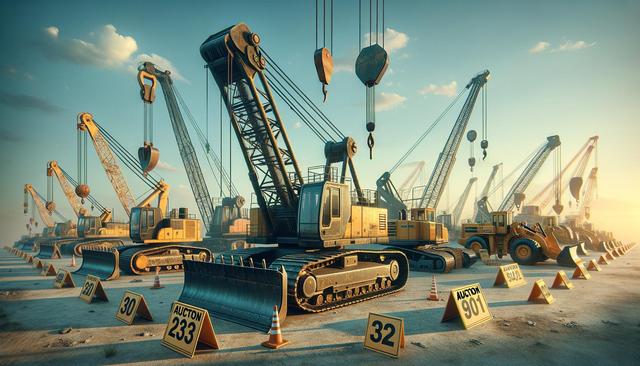Understanding Repo Auctions and Why They Matter
Repo auctions are public or private sales where repossessed assets—often heavy machinery and construction equipment—are sold off, typically by banks or financial institutions looking to recover outstanding loan balances. These auctions offer a unique opportunity for buyers to find quality used equipment at competitive prices. Unlike traditional dealership purchases, repo auctions often skip the middleman, which means no added dealer fees and a more transparent pricing structure.
For contractors, business owners, and even farm operators, repo auctions can be a practical and economical alternative to buying new or through conventional dealers. Heavy machinery including excavators, bulldozers, backhoes, and cranes can be found at a fraction of the original cost. These auctions sometimes include rare or specialized equipment that’s hard to find elsewhere, especially when manufacturers discontinue certain models or configurations.
Before participating, it’s essential to understand the auction rules. Most repo auctions require pre-registration and may offer both online and in-person bidding formats. Familiarizing yourself with the process can help ensure a smoother, more confident buying experience.
How to Identify Quality Used Heavy Equipment
One of the biggest concerns when buying used construction equipment is ensuring that the machinery is in good working condition. While repo auctions may not always allow for in-depth inspections, there are ways to minimize risk and make informed decisions.
Here are a few steps to help evaluate equipment quality:
- Review maintenance records if available.
- Check for signs of wear and tear, such as rust, leaks, or damaged parts.
- Bring a knowledgeable mechanic or equipment operator to inspect the machinery if permitted.
- Use the auction preview period to your advantage—this is when potential buyers can usually view the equipment up close.
Many auction houses also provide detailed lot descriptions, high-resolution images, and even third-party condition reports. Take the time to read through these resources and compare similar listings to gauge fair market value. It’s also wise to research the equipment’s resale value and average depreciation to understand its long-term cost-effectiveness.
Tips for Bidding Strategically at Repo Auctions
Bidding at repo auctions requires a combination of preparation, timing, and strategy. Whether you’re attending in person or online, having a plan in place can make the difference between a smart investment and an overpayment.
Consider the following tips when preparing to bid:
- Set a budget and stick to it—don’t get caught in a bidding war.
- Attend a few auctions first without bidding to learn how they operate.
- Bid late in the auction to avoid early price inflation.
- Monitor competitor behavior to identify patterns or aggressive bidders.
Remember, just because a piece of machinery is available doesn’t mean it’s a good deal. Always cross-reference current market listings and factor in transportation or repair costs post-purchase. Avoid the temptation of bidding on multiple items unless you’re prepared for the financial and logistical impact of winning more than one lot.
Advantages of Skipping Dealer Fees
One of the most attractive aspects of buying used heavy machinery at repo auctions is the ability to avoid dealer fees. These can often add a significant markup to the final purchase price, especially for specialized or high-demand equipment. By purchasing directly through auctions, buyers can access transparent pricing and potentially much lower costs.
Here are several benefits of avoiding dealer fees:
- Lower upfront costs compared to retail prices.
- More control over the final bid and total expenditure.
- No hidden commissions or added service charges.
- More direct interaction with sellers or auction houses.
In many cases, the money saved by skipping dealer fees can be reinvested into necessary repairs, upgrades, or even the purchase of additional equipment. This makes repo auctions particularly appealing for small businesses or independent contractors looking to expand their machinery fleet without overextending financially.
Finding Rare and Specialized Equipment
Repo auctions are not just a place to find standard construction equipment—they can also be a source for rare, limited-production, or discontinued machinery that’s difficult to locate elsewhere. Whether you need a specific model for compatibility reasons or a unique attachment for a niche project, these auctions can be a hidden gem.
Some examples of rare finds include:
- Custom-modified machines for specific construction tasks.
- Older models with proven reliability not available in new markets.
- Attachments and accessories no longer in production.
- Specialty equipment from industries like mining or forestry.
To find rare equipment, keep an eye on auction listings regularly and consider signing up for alerts or newsletters from reputable auction houses. Building relationships with auction contacts can also give you a heads-up on upcoming inventory that may meet your needs. Patience and persistence often pay off when searching for unique machinery at repo auction events.
Conclusion: A Smart Path for Budget-Conscious Buyers
Buying used heavy machinery at repo auctions offers a valuable opportunity for individuals and businesses seeking quality construction equipment without the burden of dealer fees. With proper research, strategic bidding, and a clear understanding of auction processes, it’s possible to secure reliable and sometimes rare machines at significant savings.
Whether you’re a contractor expanding your fleet or a small business looking to invest in essential equipment, repo auctions can be a practical and financially sound choice. By approaching the process with a well-informed strategy, you can make confident purchases that support your operational goals while keeping costs under control.




Leave a Reply